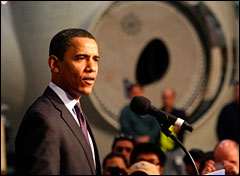
Jason Grumet.
As executive director of the National Commission on Energy Policy, a bipartisan group of 20 energy experts created in 2002, Jason Grumet has come in for some flack from environmentalists. NCEP’s influential 2004 energy report called for several measures anathema to greens, including a “safety valve” that would set an upper limit on the price of carbon and CO2 permit giveaways to coal utilities and other big polluters.
But Grumet’s experience finessing the contentious differences between opposing camps in the energy world clearly attracted Mr. Unity himself, Barack Obama. Grumet has been advising the Obama campaign on climate and energy matters, and representing it in public venues. Suffice to say, what he’s peddling now is considerably stronger than NCEP’s effort. I spoke with Grumet by phone in late April.
[Editor’s note: You can read an unabridged version of this interview. Also check out Grist’s interview with Barack Obama.]
You’ve said that climate change is a “species-threatening crisis.” Explain the distance between “species-threatening crisis” and the debate that’s taking place today.
Sen. Obama’s running to be president of a democracy. While he understands this to be one of the greatest challenges of our generation, both domestically and globally, he recognizes that many people in the Congress and in the country are trying to come to terms with their own views on the challenge. So the question is, how do you move a democratic process? The underlying premise of Sen. Obama’s approach to climate change is the recognition that there is a tremendous urgency to act, and to do so we have to find a voice and a set of policies that can be embraced not just by 51 percent of the Congress or even 61 percent of the Congress — a platform that speaks to the severity of the problem as well as the real anxieties that have made it so difficult to act until now.
McCain policy adviser Douglas Holtz-Eakin said that McCain is unlikely to put in place mandatory caps on carbon in the U.S. before China and India do. Will Obama?
First of all, that’s a dramatic policy shift from what I understood John McCain’s voice on this issue to be for the last decade, which is rather discouraging.
To be unequivocally clear, Sen. Obama believes that the United States must and will act to put a mandatory limit on our domestic greenhouse-gas emissions. That is a predicate for us leading the world to enact a truly equitable and global program in which China and India and Brazil and all the major emitting countries also put legal limits on their emissions. The story of this country has not been waiting to be led by others to address global challenges.
What would Obama say to the common objection that caps here, without caps there, would disadvantage our economy and send jobs and manufacturing overseas?
Sen. Obama recognizes that it is a profoundly unacceptable outcome if our program simply results in exporting jobs and importing carbon. It is our view that a well-designed program that provides a reasonable trajectory for technology to advance while we achieve the reductions necessary, and provides real incentives so we are reinventing and modernizing our economy along the way, is going to be economically sustainable and ultimately productive here at home.
Up until now, the developed world has been trying to lead largely absent the U.S. Our commitment is to rejoin the league of nations and work together, recognizing that China, India, and others may be a step behind us, but the global economy and global environment cannot tolerate them being more than one step behind us. So we’ve tried to put forward carrots and sticks to encourage those nations to see the benefit of advancing their own decarbonization through technology-sharing and other incentives.
The carrot is technology-sharing. What’s the stick? A carbon tariff?
Ultimately, the solution to global climate change is going to be mediated through the lens of global trade. Sen. Obama has been supportive of mechanisms that have the U.S. take a first step, and if after a period of years other nations are not acting in what is deemed to be a commensurate responsible manner, look to our trade laws to try to ensure that there’s no inequity or competitive disadvantage imposed on U.S. businesses. The idea that was initiated by the International Brotherhood of Electrical Workers, in which importers of energy-intensive products would be required to purchase permits for the carbon embedded in those products — the details need to be fleshed out, but that seems to be a reasonable approach to level the playing field, if we get there.
But Sen. Obama also has faith in the intellect of others. While he believes the United States has a vital role to play in leading this discussion, he does not believe we are going to have to bludgeon other countries into appreciating their own self-interest. Climate change is a real problem. The Chinese and the Brazilians and the Mexican government and others recognize that the exacerbating cycles of flood and drought will be devastating for countries trying to support billions of people on smaller amounts of arable land, who don’t have the same kind of water-handling and -treatment systems.
There’s been a lot of focus on making cars go farther on a gallon of fuel, and little focus on trying to reduce driving miles through public transit and urban design. Urban issues are a huge piece of the climate puzzle, but get almost no attention in these national campaigns. Has Sen. Obama given thought to these issues?
Well, let’s just say that’s the first time anyone’s suggested that Sen. Obama is not in tune with urban America.
To what extent can this problem be solved with Sharper Image techno fixes, and to what extent does there also need to be a response that affects people’s behavior? It is inescapable that it’s going to require a combination of both things.
No one in my political life has found the voice to summon that kind of self-awareness, in terms of our personal consumption, in a political context — people jokingly deride Jimmy Carter for trying to do it during the 1970s energy crisis. I personally think Americans are ready and yearning to be called upon to be part of broader collective solutions. The current administration has not given people credit for our ability to see a shared goal and strive for it together. I do believe Sen. Obama has the interest and the ability to motivate the country to appreciate that solving the problem is going to require more than just fancy new gadgets.
Taking a step closer to the ground, the senator’s very clear that the federal government sets a broad economic background through a basic price signal [for carbon emissions], but that there is going to be a critical role for states and local communities to address things like transport and zoning, which have always been much more appropriately the role of local government.
Is it fair to say Sen. Obama’s views on coal have shifted over the course of the campaign? On a panel organized by the Society of Environmental Journalists, you said his assumption is that a cap-and-trade policy like the one he’s proposing will effectively serve as a moratorium on coal plants that don’t sequester their carbon, and that if he’s unable to get that policy in place, he’s willing to take other measures that would serve as a moratorium on those plants. Given that most experts think carbon sequestration at scale is 10 years out, doesn’t that amount to saying, “No new coal on Obama’s watch”?
In some ways there has been a sharpening of Sen. Obama’s views on the issue, as it relates to the interaction between traditional energy-security questions and climate change. It became clear that we needed to be articulating policies that spoke directly to energy security and climate change at the same time. That’s why we found the low-carbon fuel standard so attractive.
The senator believes it is important that we speak in terms of the ultimate goal, which is reducing carbon emissions in the most cost-effective way possible. It has always been our view that a market-based program that puts a cap on the entire economy and leaves the question of how exactly it is executed to consumers is a more robust approach than trying to come up with a kind of command-and-control smokestack standard for coal plants and gas plants and bakeries and manufacturing facilities and the rest.
The senator understands that we cannot solve our climate challenge if we build a new wave of old-technology coal plants, because we’d be locking ourselves into an unacceptable carbon footprint, leaving us the choice of having some technological breakthrough that allows us to retrofit facilities that were not designed for carbon capture and sequestration — which seems not impossible, but hard to reach — or simply stranding these multi-million- or -billion-dollar facilities, just shut them off, which certainly is not an economically intelligent approach.
But because that is such a foolhardy business strategy, we remain confident that under a carbon-reduction regime like that which we propose, which would obligate an 80 percent reduction over the next three and a half decades, it is profoundly uneconomical to build a new facility that is going to pay a very significant fee to operate.
There’s been a lot of talk in this campaign about green jobs. But no one is quite clear what counts as a green job, where these numbers come from, who’s going to get them. Is there hard thinking going on about this in the campaign, or is it an aspirational thing?
The “green jobs” notion as it is casually expressed is meant to push against the irresponsible assertions of the last decade, that moving toward a low-carbon economy will be universally burdensome and negative. We believe that there will be big challenges and big opportunities, and the trick is to make sure that we are making changes within the manufacturing sector but not suggesting a nation without a manufacturing sector.
The question is what transformations within the manufacturing sector need to be supported, so we’re not just getting, for example, clean cars; we’re also restoring greater technological facility to domestic manufacturers, so those clean cars and components are going to continue to be built here. The other component of it is designed to make sure we are exporters of some of these technologies; we’ve all heard the same stories about the tremendous inventions that have occurred here and been commercialized someplace else. So a big component of Sen. Obama’s vision of green jobs is trying to understand what it has been about our technology policy, our manufacturing policy, that has not translated our inventiveness into manufacturing.
A lot of our focus is looking at the transition. We have a lot of momentum in our system, 100 years of driving us toward energy-intensive manufacturing and transportation systems. The campaign believes that in the early years of that transition, there will be some disproportionate impact on different industries and different regions that has to be acknowledged up front; they’re not going to be avoidable, but there are policies that will help fairly and equitably mitigate them.
[Editor’s note: Hungry for more? Read the longer, unabridged version of this interview.]



